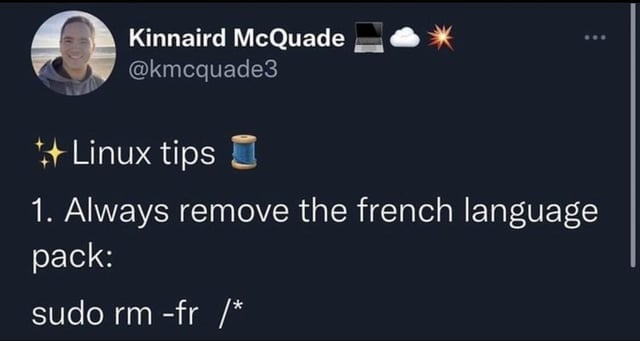this post was submitted on 12 Oct 2023
1218 points (94.5% liked)
linuxmemes
21599 readers
977 users here now
Hint: :q!
Sister communities:
Community rules (click to expand)
1. Follow the site-wide rules
- Instance-wide TOS: https://legal.lemmy.world/tos/
- Lemmy code of conduct: https://join-lemmy.org/docs/code_of_conduct.html
2. Be civil
- Understand the difference between a joke and an insult.
- Do not harrass or attack members of the community for any reason.
- Leave remarks of "peasantry" to the PCMR community. If you dislike an OS/service/application, attack the thing you dislike, not the individuals who use it. Some people may not have a choice.
- Bigotry will not be tolerated.
- These rules are somewhat loosened when the subject is a public figure. Still, do not attack their person or incite harrassment.
3. Post Linux-related content
- Including Unix and BSD.
- Non-Linux content is acceptable as long as it makes a reference to Linux. For example, the poorly made mockery of
sudoin Windows. - No porn. Even if you watch it on a Linux machine.
4. No recent reposts
- Everybody uses Arch btw, can't quit Vim, and wants to interject for a moment. You can stop now.
Please report posts and comments that break these rules!
Important: never execute code or follow advice that you don't understand or can't verify, especially here. The word of the day is credibility. This is a meme community -- even the most helpful comments might just be shitposts that can damage your system. Be aware, be smart, don't fork-bomb your computer.
founded 2 years ago
MODERATORS
you are viewing a single comment's thread
view the rest of the comments
view the rest of the comments

In Linux, the root of the filesystem is /
The command would remove recursively every file/directory in the filesystem, essentially nuking the whole system.
Im not sure if it would delete the whole system. Isn't it more likely that it will destroy everything until it kills a file/directory necessary for the operation to run?
The reason you expect this is because Windows has a file lock behaviour that won’t let you delete a file when it’s in use, in Linux this limitation doesn’t exist.
Raymond Chan, arguably one of the best software engineers in the world, and a Microsoft employee, has repeatedly lamented the near malware like work arounds developers have had to invent to overcome this limitation with uninstallers.
Think about uninstalling a game. You need to run “uninstall.exe” but you don’t want uninstall.exe to exist after you’ve run it… but you can’t delete a file that’s in use. Uninstall.exe will always be in use when you run it….so how do you make it remove itself?
Schedule a task? Side load a process? Inject a process? Many ways…. But most look like malware.
Linux has never suffered this flaw.
This seems like a pretty specific use case, but also pretty common. A system function to delete the file that called it should cover that entirely, but I guess psudo-malware is acceptable?
Pseudo-malware is pretty much the way to go as a developer in my experience.
I believe his suggestion of a javascript file that deletes itself works only works because javascript gets sandboxed and doesn't suffer from Windows "flaw" with file locks.
https://devblogs.microsoft.com/oldnewthing/20230911-00/?p=108749
While Raymond does offer a solution he's also completely side stepping any responsibility on Microsoft's part in creating and perpetuating this problem without offering their own native solution.
That last bit IMO is one reason to argue against him being the best software engineer. He might have the skills, but they are offset by his conflict of interest with MS.
So what is the solution on windows?
Generally the solution is to do something that looks like malware, or use a third party feature that side steps the problem, as happens with javascript.
https://devblogs.microsoft.com/oldnewthing/20230911-00/?p=108749
I made a Batch uninstaller (to one of my other bat scripts I think), and it could remove itself without any problem just with the command "del whateverthenamewas.bat"
Yeah, because the bat file isn't actually running, it's just a list of commands cmd should execute.
Yup, CMD acts as a parser / runtime and the process is bound to the CMD binary, the script file is being run by CMD which keeps a copy of it in its own working memory in RAM
Its running in ram so no, it would destroy everything.
What's worse is if you have any storage mounted. I've known people who wiped there backups
Thats rough. Good to know. Also one reason why I ever only connect to storage when I need it and dismount when I don’t and don’t save the credentials (and have another backup off site).
Before throwing away an old laptop, I had it do that to itself. Well, more specifically I used
shred, which doesn't just mark files as 'deleted', but also actively overwrites the bytes on disk.I started it from a TTY, so that there was no GUI that could want to load files from disk and then potentially crash the whole operation. But yeah, it just went through like normal and I ended up back on my shell (which makes sense, the shell should be in RAM).
It was only when I ran
exitto close that shell, that the system showed it was irreparably broken.I did then also take out the hard drive to whack it with a hammer, just to be sure. ¯\_(ツ)_/¯
There is no way mom would ever see my pron folder!
A lot of Linux distros load most system required processes into memory, which is why you can update while using the system. This would also allow you to (probably) delete everything.
Well, maybe. My explanation was an oversimplification.
You can always try it and see for yourself (in a VM of course).